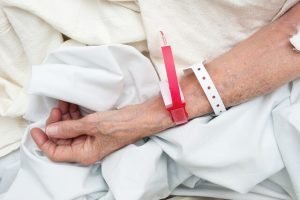
Free Consultation(203) 447-0000

Free Consultation(203) 447-0000
 At least two out of every five nursing home residents suffer from dehydration, according to the National Center for Biotechnology Information (NCBI). Dehydration can also occur during hospitalization. Severe dehydration in the elderly can result in infections, hypotension, anemia, cognitive issues, and even death.
At least two out of every five nursing home residents suffer from dehydration, according to the National Center for Biotechnology Information (NCBI). Dehydration can also occur during hospitalization. Severe dehydration in the elderly can result in infections, hypotension, anemia, cognitive issues, and even death.
As dehydration among nursing home residents is often indicative of abuse or neglect, severe dehydration may warrant a claim for compensation against your nursing home. Dehydration in hospitals and other care facilities can also give rise to claims for medical malpractice.
While some cases of dehydration in the elderly result from patients refusing liquid and nutrition, dehydration is also frequently the result of negligent or abusive nursing home or hospital care. A 2000 UCLA School of Nursing study found that many nursing home residents lacked ready access to fresh drinking water. In these and other situations, elderly individuals rely heavily on their care providers even to fulfill their basic needs.
Since it is not always true that healthcare workers have a patient or resident’s best interests in mind, it is important to be able to recognize some basic symptoms of dehydration:
Over 1.5 million people currently live in nursing homes in the United States, and this number is expected to rise. With this anticipated increase in the nursing home population, cases of neglect and abuse are expected to grow as well. By speaking up and holding nursing homes, hospitals, and caregivers responsible for their actions, victims and their families can help protect themselves and others from future instances negligence and abuse.
If you suspect that a loved one may be suffering from dehydration as a result of negligence, abuse, or medical malpractice, you should contact an attorney immediately. At Berkowitz and Hanna LLC, our skilled and compassionate attorneys have extensive experience in cases involving medical malpractice and nursing home negligence and abuse. Contact us today for a free consultation.
Berkowitz Hanna
